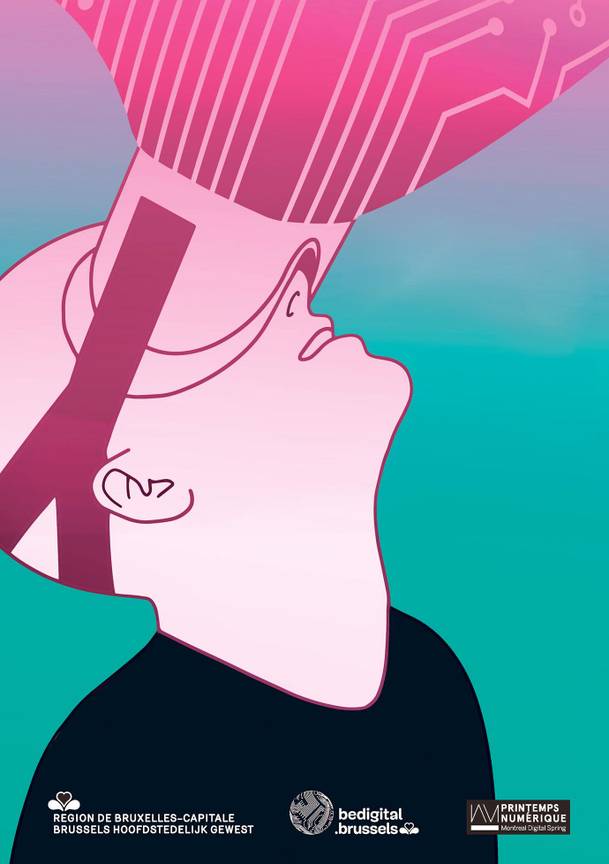More and more, cultural organizations are looking into the cross-over between creativity and technology. If you’re loving this shift to the binary, then the new festival Digital Spring is right up your alley.

Brussels Philharmonic leaves composing to the computer
After an incredibly summery winter and with the April showers already kicking off in March, we need to be tentative when talking about the seasons. However, just a couple of days after the astronomical start of spring, the Digital Spring comes blown over from Montréal. The Canadian city is the pinnacle for all things digital art: think impressive holograms, the latest trends in virtual reality, and computer-generated visual performances.
By pulling the technology festival to our capital, Brussels’s digital ambitions are crystal-clear. Just like Montréal in the Americas, Brussels wants to become a European leader in computer art. Not an easy task though, translating the binary computer code to the impressive palette at hand for an artist.
Whether the composition is computer-generated or written by a composer, music without a story is worthless
To prove that this is working quite well already, Digital Spring kicks off with an extraordinary concert. All pieces on the programme are written by an AI programme called AIVA. Pierre Barreau, CEO of AIVA Technologies, makes that process sound like a piece of cake. “We fed our programme an innumerable amount of sheet music: Bach, Beethoven, Stravinsky…all of them. Based on their creations, AIVA is able to generate new musical ideas and in fact to create wholly new compositions.”
“It’s not new to make creative use of technology in the concert hall of course,” says conductor Katleen Weverbergh, who’ll be guiding Brussels Philharmonic through the computerized creations. “Stockhausen was pioneering this over half a century ago. It feels new however, because technology now is such an important part in our everyday live. It has become an addiction really.”
It’s the technology, stupid
But for the conductor, that doesn’t mean that we are to be afraid of these new opportunities. Technology might have economic benefits, when instead of using live performers, a composer instead incorporates a recording into his work. More importantly, computers can significantly lighten the compositional process. “But is that really what we want? I would argue the process is more important than the end result. Isn’t it exactly this challenge of human capabilities that draws a listener in?”
“I wholeheartedly agree with that,” Barreau says. “But what our programme does, isn’t replacing the creative process, quite the contrary. A composer will always base his work on examples he draws from music history. What we do is offer them a tool by which they no longer lose time looking for inspiration. If anything, that means they have more time to spend on the actual creation of the piece.”
It sounds like the computer won’t be putting composers out of business any time soon. “No, and that’s really not what we aim to do with AIVA,” Barreau says. “Our programme is an assistant to the composer. That being said, it is smart enough to operate by itself. The compositions it delivers are technically correct. When asked about it, our test subjects couldn’t tell the pieces were written by artificial intelligence.”
“If I hadn’t known, I wouldn’t have guessed these were computer-generated compositions,” Weverbergh admits. “However, they aren’t masterpieces, even if they’re based on an iconic composer like Beethoven. But I feel that’s beside the point. What we’re trying to achieve in this concert is to arouse interest for this cross-over between art and technology. Now it’s my job as a conductor to interpret the sheet music the AI has created and form that into a valuable story. But that should always be my goal, whether the composition is computer-generated or written by a composer. Music without a story is worthless.”
DIGITAL SPRING 22 > 24/3, various locations
OPENING CONCERT 22/3, 19.30 Hotel de la Poste at Thurn/Tour & Taxis
Read more about: Brussel-Stad , Muziek , Wetenschap , digitale kunst , Brussels Philharmonic , Thurn & Taxis




Fijn dat je wil reageren. Wie reageert, gaat akkoord met onze huisregels. Hoe reageren via Disqus? Een woordje uitleg.